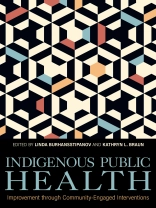Income, education, job security, food and housing, and gender and race are all examples of the social determinants of health. These factors influence the health and well-being of patients, as well as how they interact with health care providers and receive health care, and unfortunately, certain biases can become a barrier to maintaining good health in some communities. Indigenous groups in North America and US-associated Pacific jurisdictions have been subjected to occupation and forced relocation, mandated boarding schools, and other attempts by state and federal governments to eliminate their cultural strengths and resources.
Indigenous Public Health illustrates how successful community engagement strategies, programs, and resources within Indigenous communities have resulted in diverse, successful public health programs, and helped community members overcome barriers to health. Editors Linda Burhansstipanov and Kathryn L. Braun explore the problems that impact engagement efforts, discuss public health topics, acknowledge and honor the strengths of different communities, and emphasize that collaboration and the sharing of resources can only improve lives.
Mục lục
1. Introduction to Improving Indigenous Public Health through Community-Engaged Interventions: Stories of Success, by Kailyn Kawakami, Kathryn Braun, and Linda Burhansstipanov
2. Standing on the Shoulders of Our Ancestors: History and Contemporary Health Status of Indigenous Peoples in the US, by Jennie R. Joe, Jessica Saniguq S. Ullrich, Kathryn Braun, and Linda Burhansstipanov
3. Addressing Racism in Indigenous Health, by May Rose I. Dela Cruz, Lisa D. Harjo, Priscilla Sanderson, Nicolette Teufel-Shone, Donna-Marie Palakiko, Pearl Mc Elfish, Kathryn Braun, Linda Burhansstipanov, Kailyn Kawakami, and Mapuana Antonio
4. Using Community-based Participatory Research to Address Indigenous Health, by Emily Haozous, Suzanne Held, Alma Knows His Gun Mc Cormick, Valerie Rangel, Vanessa Simonds, Jane J. Chung-Do, Illima Ho-Lastimosa, Rachel Novotny, and Marie Kainoa Fialkowski Revilla
5. Building Infrastructure, Increasing Capacity, and Improving Quality in Indigenous Health Systems, by Kevin D. Cassel, Lana Sue I. Ka’opua, Kristen Mitchell-Box, Erin Peterson, Diana Redwood, Teshia Solomon, and Noel Pingatore
6. Addressing Sexual Health in Indigenous Communities, by Judith Clark, Florence Duran, Leah Frerichs, Cornelia Jessen, Naomi Lee, and Ross Shegog
7. Cancer and Survivorship in American Indians and Alaska Natives, by Ken Batai, Jessica Blanchard, Chiu-Hiseh Hsu, Lloyd Joshweseoma, Lorencita Joshweseoma, Avery K. Olson, Daniel Petereit, and Dana Russell
8. Cancer Patient Navigation Community Engagement Programs, by Kathryn Braun and Linda Burhansstipanov
9. Reducing Pre-Diabetes and Diabetes, by Francine C. Gachupin, Edna J. Helmuth, Christina L. Interpreter, Marjoree Neer, Noshene Ranjbar, Christina K. Stinnett, and Joann Tsark
10. Addressing Heart Disease in Indigenous Communities, by Noa E. Aluli, Marcia O’Leary, and Martha Pearson
Giới thiệu về tác giả
Kathryn L. Braun is professor of public health and social work and Barbara Cox Anthony Endowed Chair on Aging at the University of Hawai’i at Mānoa. She has conducted community-based participatory research in Hawai’i since 1978, and has published more than 200 articles.












